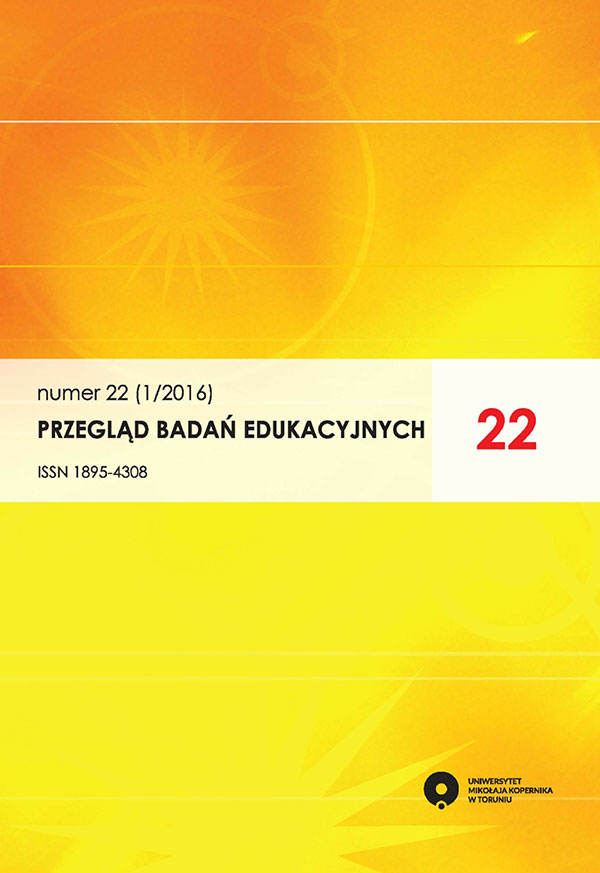Young Women’s Opinions on the Realization of Early Adulthood Period Developmental Tasks Connected Parenthood. A Research Report
DOI:
https://doi.org/10.12775/PBE.2015.062Keywords
family, parenting, the new model of fatherhood, parental leave, developmental tasksAbstract
This article is a presentation of the results of a research whose goal was to get to know and explain the opinions of young women on the implementation of the parenting-related development tasks connected with early adulthood. The attention was focused on the views of people about a new model of fatherhood. The examination also focused on how the respondents perceive the relation between personal and professional tasks in their lives. Students of pedagogy constituted the research sample. A questionnaire form was a method of data collection. A list of parenting-related developmental tasks by R. Havighurst was the starting point for the creation of a questionnaire survey. The achieved results allowed for building of the image of a family and parenthood seen by the eyes of the respondents. The fact that the examined persons prefer a model of family based on partnership is a main conclusion from the conducted research. The respondents want to fulfill themselves both in parental as well as in professional roles. They want to share the care of children with their partners, also with reference to parental leave.References
Bakiera L. (2014), Zaangażowanie w rodzicielstwo na tle współczesnej rodziny, „Kultura i Edukacja”, nr 2, Wydawnictwo Adam Marszałek, Toruń.
Beck U., Beck-Gernsheim E. (2013), Całkiem zwyczajny chaos miłości, Wydawnictwo Naukowe Dolnośląskiej Szkoły Wyższej, Wrocław.
Brzezińska A. (2010), Społeczna psychologia rozwoju, t. 3, Wydawnictwo Naukowe „Scholar”, Warszawa.
Calton J.M., Heesacker M., Perrin P. B. (2014), The elusiveness of progressive masculinity: Gender differences in conceptualizations of nontraditional gender roles, “Journal of Gender and Power”, vol. 2, no. 2, Uniwersytet Adama Mickiewicza, Poznań.
Chlewiński Z. (1991), Dojrzałość, osobowość, sumienie, religijność, „W drodze”, Poznań.
Fuszara M. (red.) (2002), Kobiety w Polsce na przełomie wieków. Nowy kontrakt płci?, ISP, Warszawa.
Harwas-Napierała B. (2000), Psychologia rozwoju człowieka. Charakterystyka okresów życia człowieka, Wydawnictwo Naukowe PWN, Warszawa.
Havighurst R. J. (1953), Human development and education, Longmans, Green, New York.
Klein D. M., White J. M.(1996), Family theories. Introduction, Sage Publication International Educational and Professional Publisher, Thousand Oaks, London, New Delhi.
Lachowska B. (2010), Konflikt i facylitacja jako mechanizmy wzajemnych oddziaływań pracy i rodziny – analiza różnic płciowych, w: T. Rostowska, A. Peplińska (red.), Psychospołeczne aspekty życia rodzinnego. „Difin”, Warszawa.
LachowskaB. (2012), Praca i rodzina, konflikt czy synergia?, Wydawnictwo KUL, Lublin.
Melosik Z. (2006), Kryzys męskości w kulturze współczesnej, Oficyna Wydawnicza „Impuls”, Kraków.
Ostrouch-Kamińska (2011), Rodzina partnerska jako relacja współzależnych podmiotów. Studium socjopedagogiczne narracji rodziców przeciążonych rolami, Oficyna Wydawnicza „Impuls”, Kraków.
Rubacha K. (2000), Pełnienie roli nauczyciela a realizacja zadań rozwojowych w okresie wczesnej dorosłości, Wydawnictwo Uniwersytetu Mikołaja Kopernika, Toruń.
Rubacha K. (2008), Metodologia badań nad edukacją, Wydawnictwa Akademickie i Profesjonalne, Warszawa.
Ruczko M. (2010), Studium przypadku w naukach humanistycznych, w: H. Kędzierska (red.), Jakościowe inspiracje w badaniach edukacyjnych, Wydawnictwo Uniwersytetu Warmińsko- Mazurskiego, Olsztyn.
Wayne J. H., Mussica N., Fleeson W. (2004), Considering the Role of Personality in the Work-Family Experience: Relationship of the Big Five to Work-Family Conflict and Facilitation, “Journal of Vocational Behavior”, no 64.
Witt L. A. , Carlson D. S. (2006), The Work-Family Interface and Job Performance: Moderating Effects of Conscientiousness and Perceived Organizational Support, “Journal of Occupational Health Psychology”, 11, 4.
Zimny J. (red.) (2013), Ojcostwo, powołanie czy zadanie?, Katolicki Uniwersytet Lubelski Jana Pawła II Katedra Pedagogiki Katolickiej, Stalowa Wola.
Downloads
Published
How to Cite
Issue
Section
Stats
Number of views and downloads: 1540
Number of citations: 0



